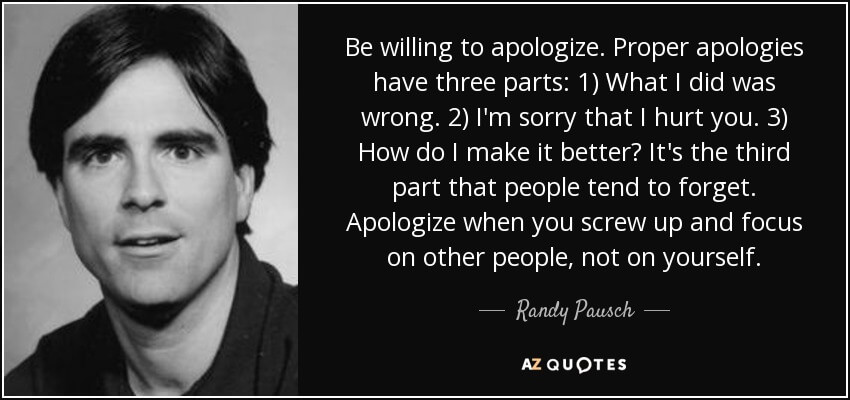
In “Good to Great“, Jim Collins talks of five levels of leadership, the highest being Level 5.
Level 5 leaders have all that it takes to be at the first four levels, but in addition, have a unique blend of humility and indomitable will.
My writing at this site is aimed at leaders either at Level 5 and seeking to keep growing, or truly hungry for being at or beyond Level 5 and committed to the path.
You’ll, therefore, see post after post talking about self-leadership, vulnerability, awareness, empathy, listening and more.
As Socrates said “Know Yourself”, or, more humorously “Be yourself..everyone else is already taken!”
So, today some simple tips on apologies from leaders.
First, what reasons might a leader have for saying sorry?
Simply put, to take responsibility for an error they or their organisation may have made?
That’s about it.
The key to great leadership at such times is what the intention is. We’ve all see the “CYA” (cover your a**) apology, clearly been run through the legal department first and give for “damage limitation” and “PR” reasons.
Oh, and there is also the “I’m sorry.. but” apology. Basic NLP here, the “but” negates everything you said up to that point. Be very, very careful whenever you consider using “but” at any time in your language!
So, recently I was reminded by my friend Jeff Raker (a past guest writer on this site with “The compass matters more than the calendar“) of the power of a leader truly taking responsibility through an apology.
First, a lesson from Randy Pausch on how to apologise, then the story from Jeff’s recent post.

In an earlier post “I was wrong“, I talked about the power of this with examples from various leaders, closing with:
Randy Pausch on what makes an apology :
“Proper apologies have three parts:
1) What I did was wrong.
2) I feel badly that I hurt you.
3) How do I make this better?”
Leadership is so simple, we do so over-complicate it.
Be humble, be confident, believe in your people, be purposeful.”
Three steps to an apology. Taking responsibility, acknowledging your impact, then, critically, making it good.
Oh, if you have not watched it, the “Last Lecture” by Randy Pausch is powerful and moving, full of life and leadership lessons.
So, Jim Collins talks of Level 5 leaders having humility and indomitable will, I now see that in that past post I wrote : “Leadership is so simple, we do so over-complicate it. Be humble, be confident, believe in your people, be purposeful.”
Now, more on apologies from Jeff Raker (post link here):
1 killed. 25 injured. Homes destroyed. Where? In Boston. What? A gas line explosion.
Words always matter. They matter even more in a crisis. Leaders get in front of as many people as possible, as soon as possible, and pay attention to their words.
The President of Columbia Gas, Steve Bryant, owner of the gas line, said this:
“We are sorry and deeply concerned about the inconvenience,” he said. “This is the sort of thing that a gas distribution company hopes never happens.” – Steve Bryant, President Columbia Gas
Words are extremely important.
I’ve said inappropriate or insensitive words before. My guess is you have too. What do you do then? What does Mr. Bryant do now?
Get in front of as many people as possible, as quickly as possible, and apologize for an insensitive word. Own the issue, this is what leaders do. Deflection, blame, excuses – these are not the words of a leader.
Every time a leader doesn’t own their words, they are most likely protecting themselves; making it about them. It’s not about you. It’s not about your ego or reputation or what you think people might think about you. It is about your words and your company or team. Everyone else already knows it was insensitive or inappropriate. Admit it.
Say, “I’m sorry.” Mean it and it will make all the difference in the world.
